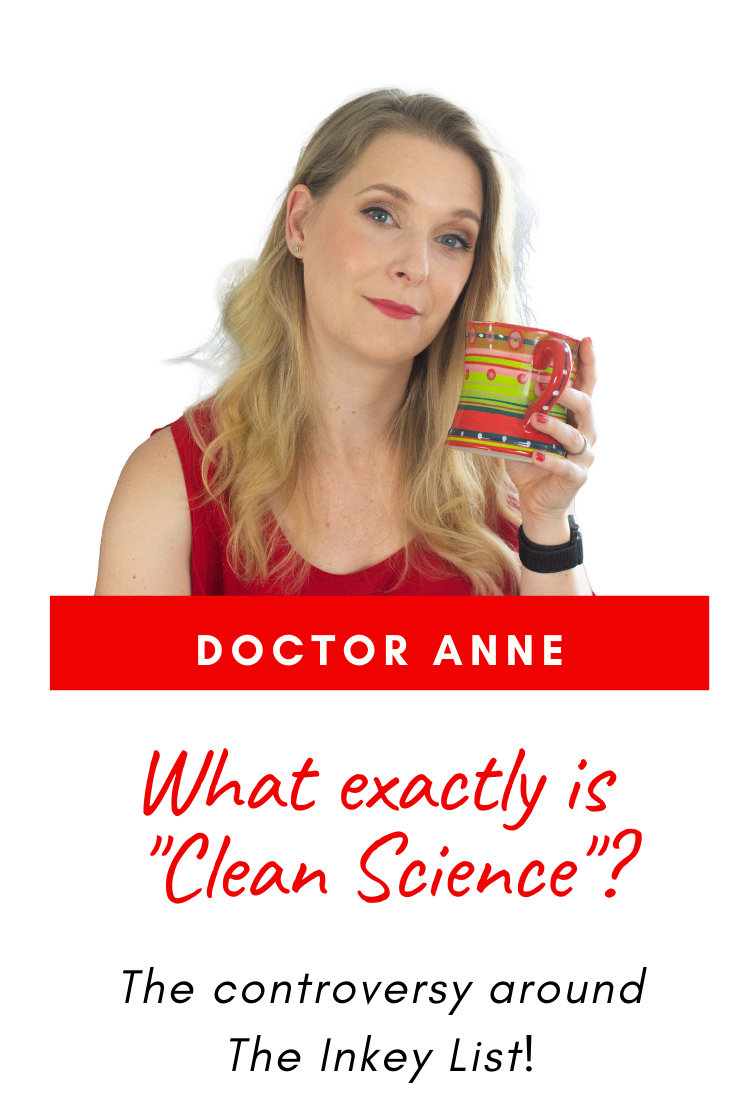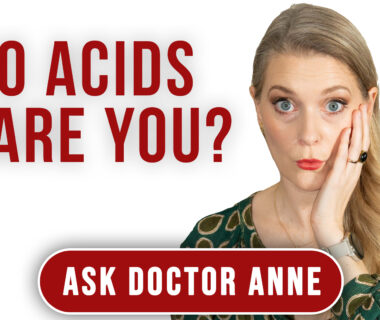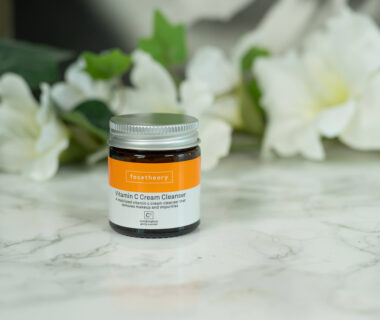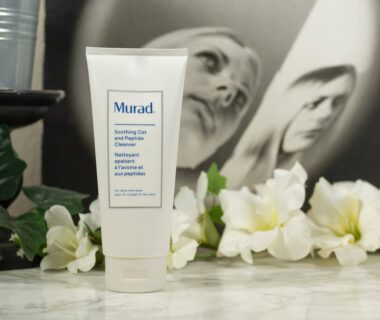Just to make that clear from the start:
This is not a post about the skincare benefits of tea.
It is not a drama thing in terms of “spilling the tea” either, I much prefer to stay away from any drama.
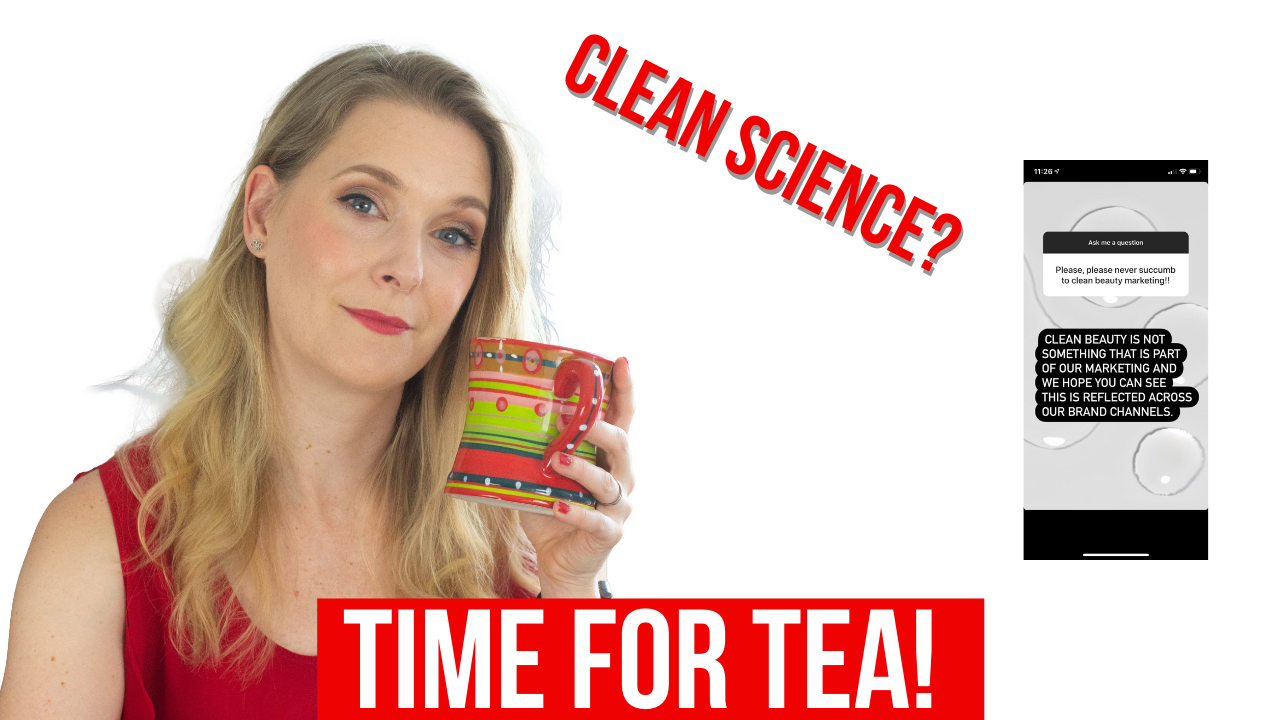
But a few things happened recently that I wanted to share my thoughts about, the most pressing (but not the only one), being the recent controversial discussion around The Inkey List and the term “Clean science”.
The Inkey List has been featured on my channel numerous times and it has been no secret that I loved the brand. But it is also no secret that I firmly oppose the “clean beauty” movement, I talked about that in this video in length.
So grab a cup of tea and join me as I tell you how I feel and how I am going to proceed with talking about The Inkey List in the future.
If you don’t know what I am talking about, let me bring you up to speed:
Who is The Inkey List?
The Inkey List is a brand launched in 2018 and, as they state on their website, born from the belief that better knowledge powers better decisions. Their products are affordable and usually focus on a main ingredient rather than a function, for example “Hyaluronic Acid Serum” rather than “Hydrating Serum”, similar to the brands The Ordinary or Good Molecules.
What sets them apart is the focus they put on actually educating the consumer, a mission that is very dear to my heart. I believe that with the huge amount of skincare products available, the best way to shop is to understand basic principles of skin and skincare so you are no longer dependent on brand claims, but can identify what your skin needs and then see which brand you want to buy it from.
Because, let’s face it: Almost every brand has a decent hydrating serum, which one is best for you depends on your budget, your texture preferences, whether or not you want fragrance or non-fragrant products and, last but not least, which brand is easily available where you live.
So as you can see, The Inkey List seemed to be a brand that aligned with my values and that I have subsequently been promoting on my channel without having any kind of relationship with them – no PR, everything purchased myself.
What happened?
The first thing that confused me a little was when they launched their hair care line (which I reviewed here) and the packaging included a bunch of “free from” claims, which not only violates EU regulations (see the video here), but also is a common fear mongering tactic used – not what I had expected.
Then The Inkey List launched their new project, INKEYschool, where you can watch different “modules” on skincare topics. The videos are all under ten minutes and presented by different members of The Inkey Lists team.
So far not a bad thing, but there was one video that led to a huge uproar, and that was the last one if the “Ingredients 101” module, called:
“Ingredients that shouldn’t be in my skincare and why?”
Just a quick recap:
ALL ingredients used in your skincare products are safe. There are individual ingredients that might not agree with your skin, if you have allergies for example, or that you might want to avoid due to lifestyle choices, like beeswax or honey if you are vegan.
But the rest of the ingredients, and yes, that includes parabens and fragrance, are safe in the way and dose they are used in skincare formulations – it is illegal to harm your customers, and also a bad marketing choice.
There are many brands that will tell you otherwise, referring to themselves as free from “toxic chemicals”, and parabens are among those ingredients usually referred to. That is based on a study performed in 2004 that not only had a few weaknesses in design, but was also cited wrong in the media, all of which led to the perception that parabens are linked to cancer.
Now this study has long been disproved, and all official bodies involved in regulations regarding consumer safety regard parabens as safe and well-studied option to fight bacterial overgrowth.
Sadly the public opinion has not followed lead here, fueled by many a brand that claims to be “paraben free” as part of being “clean” and “non-toxic”.
The video The Inkey List published said that they chose to go “paraben-free as the cautious option”, which implies that there is a risk when using parabens, which, as I just pointed out, there is not.
Going paraben-free is NOT the cautious option, it is in fact more risky, as parabens are our most studied and well-tolerated preservative, and unless you want to go preservative-free, which is only possible for a selected amount of products, you need to rely on other preservatives that we have less data on in regards to safety and long-term effects.
The video basically fed into the fear mongering tactics used by a few brands to position their products as the better alternative to those of their competitors.
Nothing new, but absolutely NOT okay for a brand claiming to be, let me read it to you again, “born from the belief that better knowledge powers better decisions”. Better knowledge is NOT spreading misinformation, that is absolutely unacceptable.
Now what about “Clean Science”?
Shortly after the INKEYSchool was released and the conversation around the video was starting, The Inkey List participated in a series of Cosmetics Business seminars, more specifically in the one called “The outlook for Clean Beauty”, as speaker in June. These seminars are aimed at industry professionals and here the term “Clean Science” was used as term to speak to these costumers that want both the “science” and the “clean” in their products.
Again: “Clean” is not a regulated term, and it means both a million different things and nothing at all. Which is quite the opposite of science, where things have a clear definition, so everyone knows exactly what you mean when you talk about something.
But there is more: Calling yourself “clean” implies that others are “dirty”.
So if there is “Clean Science”, what actually is “Dirty Science”? Is one better than the other? Is there a kind of science we should not trust?
Well, actually there is. Pseudo-science, which is how I would paraphrase “Clean Science”, is a dirty business where you pick data regardless of its credibility and use it to underline your beliefs – just like picking a discredited study on parabens.
The term “Clean Science” is nothing more than a marketing term, trying to make money combining two trends. It has no deeper meaning, it is not even NEEDED. It is yet another way to try and trick customers into buying your products over those of your competitor.
How did that make me feel?
First of all, science is not about feelings. It is as void of personal feelings as it can possibly be (we are all human after all) and eliminating how we feel about a topic is one of the many challenges a scientist faces. “It feels better” is the least scientific argument one can make. But still, I had a lot of feelings here!
Not to sound melodramatic, but I felt like I had been cheated on. You see, I have been promoting the brand for a long time (again, free from any compensation, no money, no products were exchanged!). I frequently recommended them to you and my family members, both because many of their products are amazing, but also because they seemed to align with my values.
And I felt that these values, giving correct information so customers could make their decisions based on that information without being tricked by fear or clever paraphrasing, I felt that these values had been betrayed.
It hurt. I didn’t know how to react, after all looking at my channel puts me in close proximity with the brand and in close proximity with fear mongering and misinformation, which, even worse, comes cloaked as trying to educate consumers in the light of science.
I considered several things, among them deleting all 14 (!) videos I had on The Inkey List products, but in the light of the most recent events decided to do this post instead to get it off my chest and hopefully engage with you in the comments to find out how you feel about the topic.
And because I know I will get the question, let me quickly answer the following:
But Doctor Anne, you DO promote other clean brands here, how is that different?
For me, there is a very important distinction between promoting a product and promoting a brand. I adore several products of brands that I don’t share values with, and I will usually state that whenever I upload a review on these products, like I did when I reviewed the “Avon Distillery Clean Beauty”.
As I have said before: It is not the products fault that the brands marketing team talks sh*t.
What makes the difference here is that it comes from a brand that presents itself as educating and science-based.

How has The Inkey List reacted to that?
Well, for quite some time they didn’t react at all. But with more and more people calling them out on Instagram and other Social Media channels, they published a statement on their InstaStories which is saved in their highlights and which I will include as screenshots now.
In this statement they distance themselves from “Clean Beauty” and the term “Clean Science”, saying that it was only used in a panel discussion they hosted and not something they ever have or ever will attribute to their products or brand.
They also removed the video in question from their website, stating that it needs to be reedited because it did not provide the information they intended and was misunderstood.
There is however to my knowledge still no comment on the “free from” prints on the packaging and no clear stand regarding the paraben issue.
How will I proceed now?
While I am thankful for the statement, I am still cautious as to whether I fully believe them or not. I have decided for the time being not to remove my videos, but I will also not publish any new ones on the brand – I am sorry if you have been waiting for my review on their Retinol eye cream, it is as good as finished, but will have to take a back seat now.
Other than that I have no ties to cut with them, so I will see how things develop and in the meantime keep drinking tea and talking about other stuff.
How do you feel?
